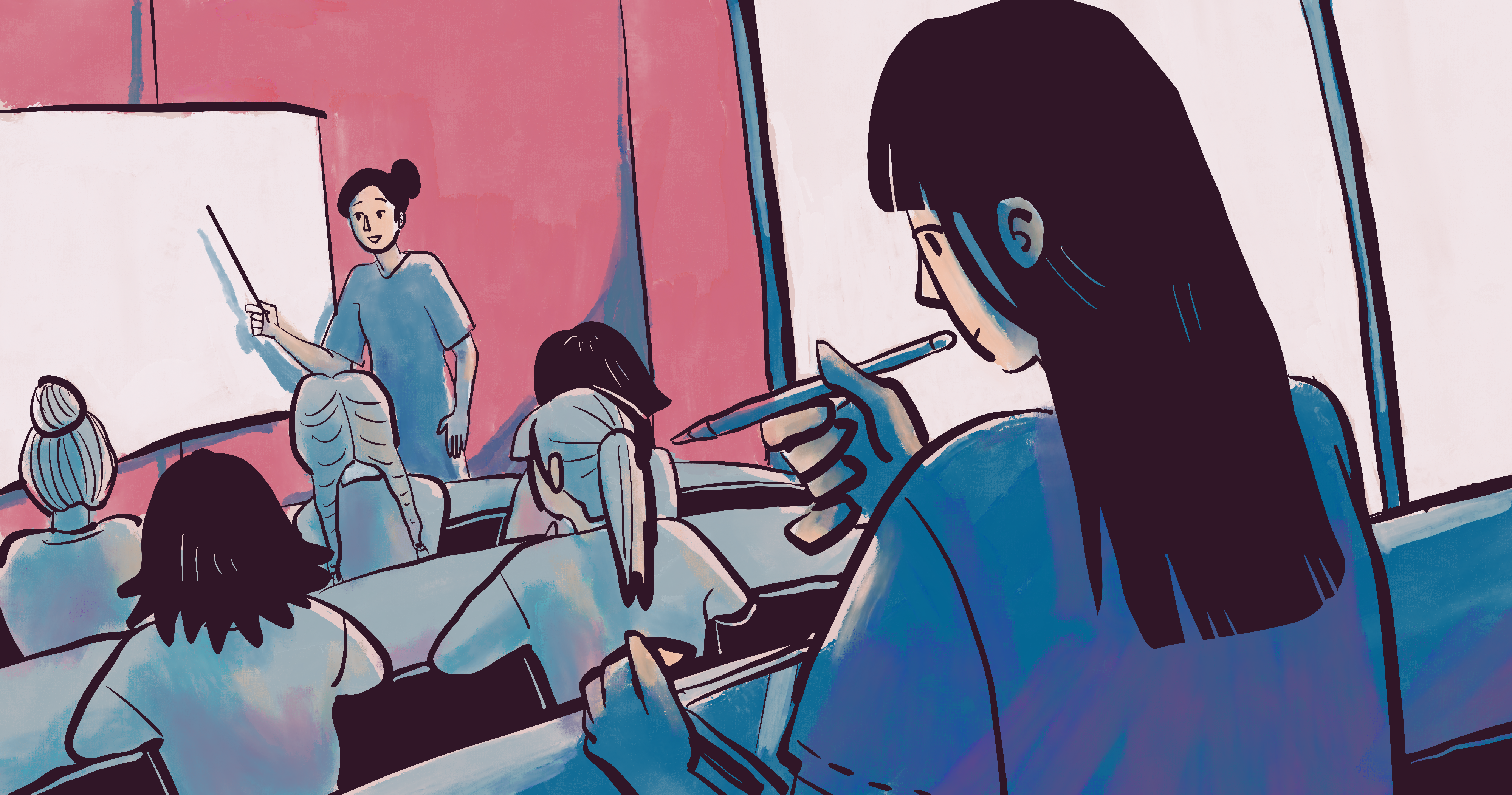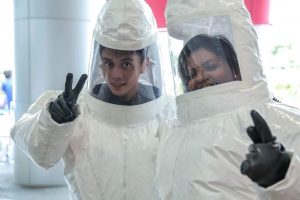All illustrations by Lo G for RICE Media.
Tammy Low has left Singapore for her studies.
All her life, she’s wanted a job that allows her to help people. In the broader scheme of things, we’ve understood that desire in the form of jobs in healthcare, service, politics, or even entertainment.
A fresh poly graduate from Temasek Polytechnic at 21, Tammy is now in the United States, having just kicked off her major in respiratory therapy at Ohio State University. She’ll be there to study for the next few years before joining the healthcare sector as a professional.
It’s a job that not many—not even those with a long-harboured ambition to be a doctor—would normally consider. It wasn’t the case for Tammy either. So, what changed? And how did she get to her current study path that none of her peers know about?
Changing Lanes
In her early years as a primary school student, Tammy wanted to be a teacher. In secondary school, biology became her favourite subject.
The roads toward a career, which would circle back to where she started as a student, seemed to glisten with promise. It was her friendship with someone who was already in polytechnic, however, that changed her mind.
She had a friend from church who was studying pharmaceutical sciences—the more she learned about it, the more her desire to help people grew.
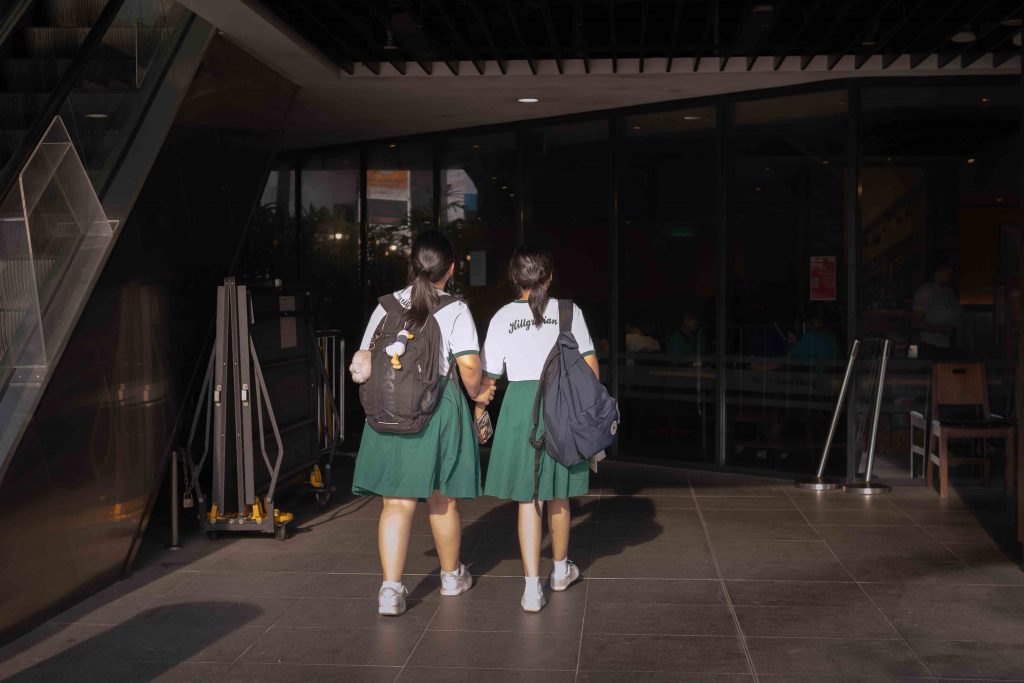
“I was interested in how components inside medicine would help one person feel better or recover from an illness or disease,” she says. “I just wanted to learn in-depth about how medicine actually works in the body.”
That was her new route, she realised. Well… at least for a while. Knee-deep in her studies, fully committed to her diploma in pharmaceutical science, she had an aching revelation: she wanted more. She was keen on a role that required involving relationships with the patient. While pharmacists work directly with patients, Tammy wanted to “follow them in their journey towards recovery” every step of the way.
She’s not alone in experiencing some form of regret and uncertainty. A study published by TODAY, which was conducted by Nanyang Technological University, found that about a quarter of post-secondary school students regret their chosen courses—be it A-levels or polytechnic diplomas.
Tammy wasn’t “lost in the sauce”, as the 2010s-era terminology that expressed overwhelming confusion would define, as much as she was finding new pathways forward. An internship at a research facility didn’t spark any new ideas either.
However, her chosen route eventually made her breathe easy. She just couldn’t study it in Singapore.
Moving Images
Nurturing an interest in a highly specialised field can apply to many sectors.
In the case of Matthew Yang, it runs deep through his passion for preserving film history. A vast range of works that could prove important to a country’s film culture are normally stored in different mediums—from 35mm celluloid film prints to home videotapes. This pressed for the need for proper archival and preservation in a highly digital age.
For example, film prints require specific storage conditions—film and tape are sensitive to our nation’s humid climate. When not stored properly, they’re susceptible to massive (and irreparable) degradation over the decades. The result? Countless pieces of work that could forever be lost to time and decay.
“Singapore is a pretty young country, so we’re still in the process of solidifying our identity. Moving images are a great source of that,” explains Matthew, 31, over a call from his home in New Jersey.
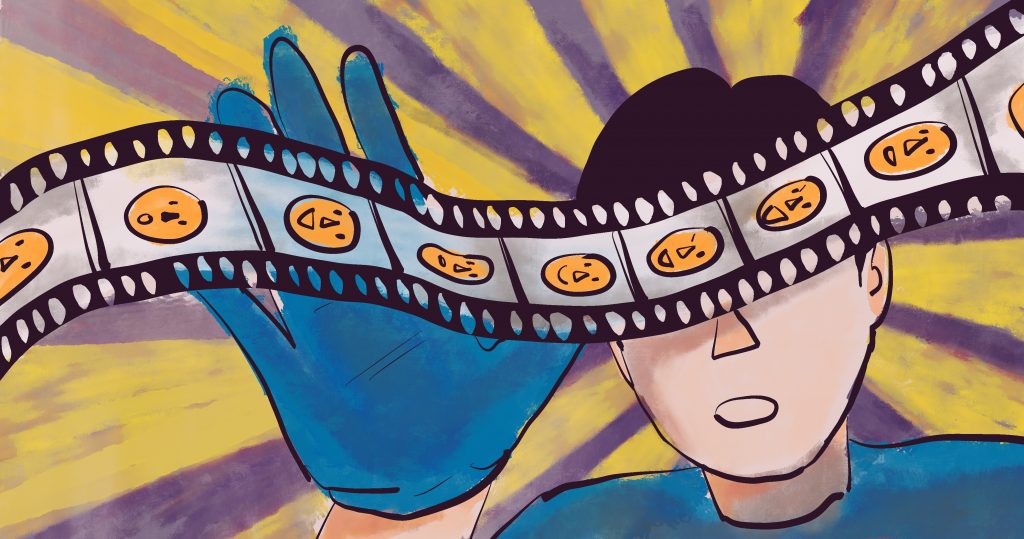
Matthew is currently pursuing his master’s at New York University, studying Moving Image Archiving and Preservation—the “moving image” part refers, for starters, to feature-length films, short films, and works for television.
“Many Southeast Asian films from the early 1900s onwards can only be read about and not watched,” he says, noting that many such films were not fortunate enough to be preserved by the archivists of the past if there were any.
Previously an archivist at Asian Film Archive, an organisation dedicated to charting and preserving film in Southeast Asia, Matthew found himself in a job that spoke to his desire to discover and study once-forgotten art, with the aim of bringing it to new audiences.
Before working full-time, he had completed his honours degree in film arts and history locally. While clinching the job at AFA would have, presumably, confirmed his belief that his studies thus far would suffice, he wondered if he could do more in his role.
“I needed to fill a lot of gaps in my knowledge,” he professes.
Study Specialties
For both Tammy and Matthew, they found that the only places for further study were long-haul flights away from home.
After her research internship, Tammy searched again. She attended a talk by a respiratory therapist. Soon after, she clinched a job shadowing opportunity in that field at a public hospital.
On a normal day, she would follow the therapists around during their routine duties—observing the process of intubation and extubation on patients, viewing and interpreting charts and medical documents, and using the information to recommend further procedures. If there are any procedures to be done, she explains, they will approach the residing doctors on the best ways forward.
“It’s a team effort, which I really like,” she emphasises. “The idea of working [directly] with nurses and doctors and other allied health professionals—all for the betterment of the patient’s health.”
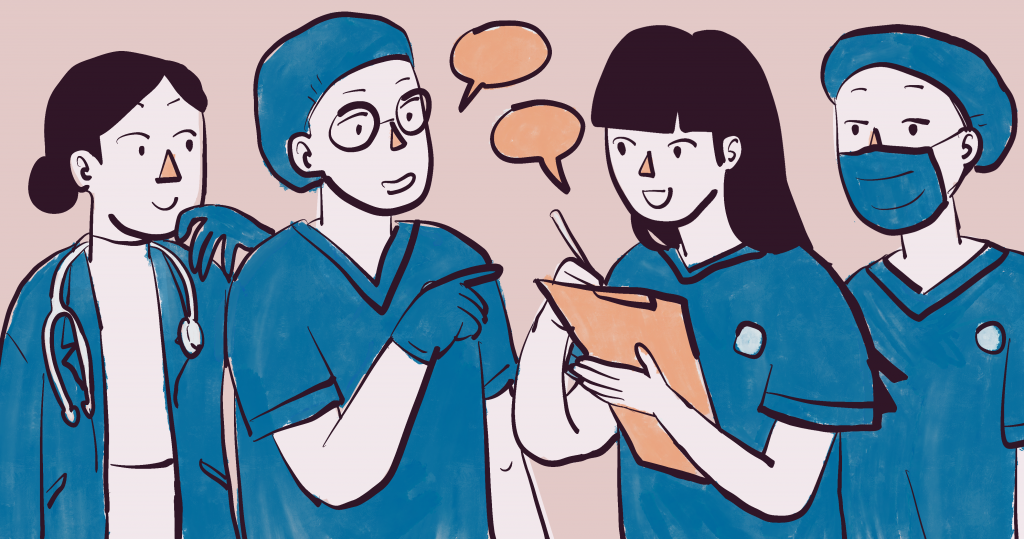
During her job shadowing, Tammy found what she needed—a job that would prioritise care and attention. Now, it required her to study more. Respiratory therapy is not currently offered as a degree in Singapore. One place that does possess such a degree course, which would qualify her for the job, is all the way in Ohio. A scholarship with MOHH has made it possible for her to be there.
Right now, Tammy has settled into her dormitory after saying her goodbyes to friends and family at the turn of 2023. Her father, having spent her first few days in the city with her, has left for Singapore.
“I brought many pictures of friends or family, along with letters and gifts from my friends,” she tells me. She’s since lined up several small plushies, a favourite gift of hers, in her room. She didn’t think to bring any food from home, but now she’s thinking twice: “I kind of regret that now!” she mentions.

She’s excited about being in the US—it’s entirely new territory to her, and even the ebbs and flows of daily life are something she’s getting used to. “The culture here is quite different!” she notes. “Like, every time you see someone or you meet someone, you have to say, like, ‘How are you?’” Her coursemates are also learning to get used to her Singaporean accent.
Tammy’s unfazed—she does want to study towards a job that will entail dealing and working with people, after all.
“I still have a lot to learn about interacting with people, like ‘How do I interact better with different groups of people so that they have trust in me?’” she poses. “And, at the same time, delivering my role for them and their well-being?”
A scholarship also made it possible for Matthew to study at New York University, a highly-reputed institution with plenty of resources and experts for him to consult. He will conclude his studies in May this year.
There wasn’t much of a culture shock for him when he first moved there. He’s enjoyed his life as a student immensely. “It is a very specialised field,” he adds, “and the community is very supportive and encouraging of students to keep the profession growing.”
Unlike Tammy, he hasn’t felt a longing for local food: “One can eat around the world in New York.”
Facing Futures
While Tammy is on the cusp of beginning her studies, Matthew is winding down his. Both, however, are connected in the ways they’re determined to contribute to a public service larger than themselves.
“Archivists can help curate the important and meaningful [works of art], and then preserve it for the next generation to make sense of the narrative of our society and country,” Matthew says, adding that the work done by AFA and film programmers have already been invaluable in this field.
He wants to help develop the profession, which is still relatively new in Singapore, even further. He also hopes to see more community-led initiatives that he can add to.
For Tammy, she ultimately wants to fulfil her lifelong desire to help people. Despite changing courses and searching through professions, she believes she’s found her niche.

Back in her days of job shadowing, Tammy recalls one moment that touched her. One patient required the removal of tubes from their body—or extubation as it’s known. The patient’s health had improved to a degree that didn’t require these tubes anymore. But removing such tubes is not easy, and it can cause great pain to the patient.
“During the process, the patient looked really uncomfortable,” she remembers, before adding that the entire ordeal only lasted a few seconds.
It was the teamwork of the healthcare workers involved in the patient’s healing process—the nurses, the doctors, the respiratory therapists—that made the patient’s next step towards recovery as painless as they could.
Through her polytechnic education, she learned how medicine could elevate the well-being of just about anyone. Through shadowing professionals on the job and through her ongoing education, she’s learning the value of making the process of recovery and treatment a humane one. After many years, she’s finally found her purpose.
“That moment alone was really fulfilling,” Tammy says.
“That was when I realised I wanted to do this.”

